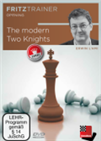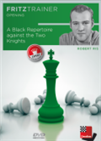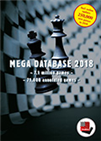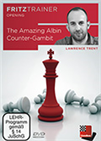A review
It's summer in the USA, we have a lot of tournaments, and I definitely want to spice up my openings. Just in one month I have 15 tournament games to play, and next month, another dozen!
I love history, and chess history, but I admit I don't have time to delve into it, because I'm a tournament player. It was nice to hear GM Williams presenting a little about Captain Evans' life.

I didn't know the gambit was invented in 1824, but it was played in 1829 (Williams first mentioned 1827 and then changed date to 1829 — I'm just mentioning as "reviewer duty", not because 1-2 years makes any difference. Generally the ideas behind the moves, and the plans are important for using this opening in tournament).
A strange thing which happened, when I was looking for games on this opening in the database, I was able to find a predecessor game to the one mentioned and shown in the first video by Williams. Obviously, those chess players more interested in history will be able to comment, and tell us precisely when the first game was played. I just report it here for sake of knowledge:
Who are the players who created the renaissance for an opening forgotten and not played at the top level for a while? Williams mentions Nigel Short, Laurent Fressinet, and some young Chinese players.
While working on this review I also found some recurring names, and I saw they love to use it in rapid time control games. This tells us we can learn this opening, and use it as surprise weapon for rapid and blitz games.

One of the recurring big names is Harika Dronavalli. She is one of the best Indian players. She has used the Evans gambit with great results, as you can see in the following games:
The computer revolution has clearly influenced the way chess openings are played. Williams immediately admits computers have invented strong defensive moves which do block most of White's attempt. However humans are not computers, they cannot really memorize well long sequences of moves, let along entire games.
This is a true gambit, where White is one pawn down, and the compensation is the attack. An amateur or a player who sincerely wants to improve should play this opening just to learn the art of the attack.

To summarize the ideas of the Evans Gambit, as in the diagram above we see White gaining a tempo attacking the b4-bishop, and such pawn lever helps to control d4, and facilitate the push d2-d4 at the right moment, while the move c3 has opened the diagonal for the queen, which can go to b3 and exert pressure on f7.
As always in the opening one's goals should be: quick development, fight for the centre, bring your pieces out, and attack, attack, attack! Here an example of compensation, when White is able to dominate the centre thanks to his pawns.

The centre domination can transform itself into more tempi; when pushing the pawns, we oblige the enemy to dislodge his own pieces. Another factor which can give us many won games is space. Yes, pushing the pawns can become a space advantage which helps our pieces to coordinate, all at the cost of a single pawn, but please don't tell him that!

Williams, in this DVD, is going to analyze all of Black's replies, but that only means the decent ones. Obviously, he will spend more time on the lines where Black accepts the pawn.
He also does a good job in outlining typical manoeuvres, and typical moves, which are played to neutralize White's above-mentioned advantages.

The DVD doesn't cover 1.e4 e5 2.Nf3 Nc6 3.Bc4 Nf6 Williams recommends going forward with 4.Ng5:


ChessBase has two interesting DVDs, which one should consider studying if playing the Two Knights: L'Ami - The Modern Two Knights, and Robert Ris - A Black repertoire against the Two Knights. One must remember to study the opening also from the opposite side, to be sure he covered all the possibilities.
Williams makes the case for playing Bc4, instead of the Ruy Lopez. Saying nowadays to play the Ruy Lopez means to enter the Boring-Berlin Defence.
 The "Mega" is the database every serious chessplayer needs. The database contains 7.1 million games from 1500 to 2017, in highest quality standard, full of top level analyses and completely classified.
The "Mega" is the database every serious chessplayer needs. The database contains 7.1 million games from 1500 to 2017, in highest quality standard, full of top level analyses and completely classified.The DVD comes with a model games database of 50 games, as well as a work database based on the 20 games treated in the videos. The work database is the one to be updated after possible tournament games, in order to better understand the theory, and create our own.
As always, I create a database on the opening I'm studying, in this case, the Evans Gambit is based on the ECO keys C51-C52 and in my Megabase 2018 there were a little more than 8100 games.
Thanks to ChessBase tools we can play some key positions against the engine. I'd like to add to this review one position which can happen in the Evans Gambit if Black doesn't know the right continuation, and let you try it against the engine. Then of course when one will get the DVD will discover many more ideas, or better understand this and others. The point is that the Evans Gambit can bring you to some exciting positions, which we do want in our tournament games.
Black just played 8...Nf6; which was a mistake, can you win from here?
Play your moves against the engine right on the diagram!
Pro and cons
 On this DVD IM Trent shows the Albin Counter-Gambit (1.d4 d5 2.c4 e5). Trent found a number of extremely dangerous Theoretical Novelties which will truly put the Albin Counter-Gambit back on the map.
On this DVD IM Trent shows the Albin Counter-Gambit (1.d4 d5 2.c4 e5). Trent found a number of extremely dangerous Theoretical Novelties which will truly put the Albin Counter-Gambit back on the map.In the beginning, Williams says most gambits today have disappeared, because of computer analysis. I disagree with this statement, and I think gambits are quite alive and make everyone who plays them gain points. Just think of the Smith-Morra gambit in the Sicilian, or the Benko gambit, or the amazing Albin Counter-Gambit, and of course many more (even the Scandinavian has its own gambit!) I believe them to be especially alive in this age because most opponents don't really know how to play against them.
Of course, I do understand that at Williams' level (GM/IM) many gambits could just lead to a draw. But here a little secret: the 98% of chess players will never reach GM/IM level, so for them, gambits are alive and fun!
Before closing, just one last game. Often as reviewers or teachers, we describe the opening or DVD or book only under a positive light. We must never forget that the game of chess has three possible results, and Black against the Evans gambit can win too, as in the following example of one of the best GM authors/coaches/players in the USA:
Final thoughts
The Evans Gambit can be a useful weapon when one needs to surprise the opponent and play for a win. It can definitely help us improve our attacking chess, and better internalize concepts like development, initiative, and attack. The right choice of openings is fundamental both for the development of the player, as well as the success in the tournament arena. Give the Evans Gambit the chance to work for you and create havoc and chaos in the opponent's territory!
The Evans Gambit is an attempt to destroy Black in gambit fashion straight out of the opening. Featuring games of old, and numerous new and exciting ideas, this DVD will give you a genuine and more exciting way of playing the Giuoco Piano.
Links
























